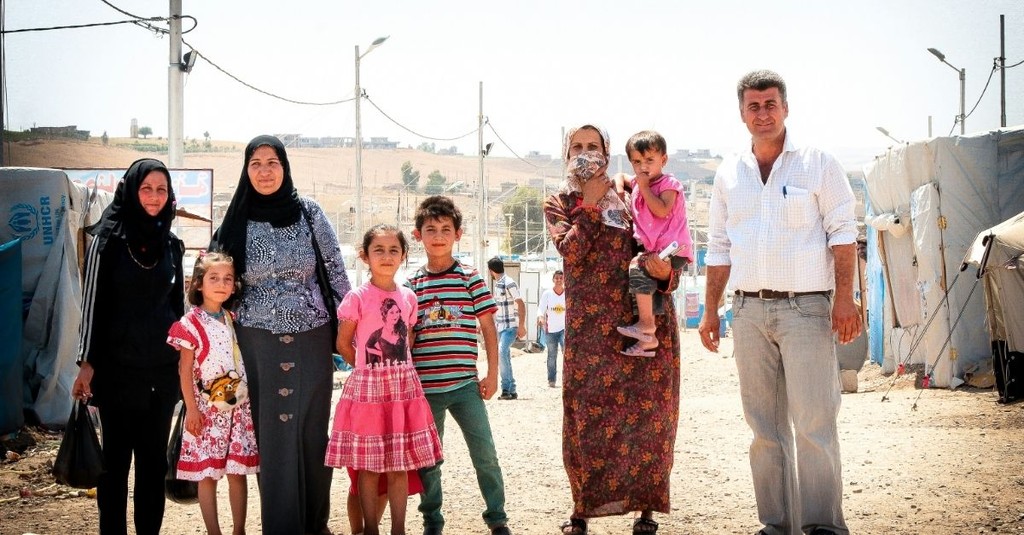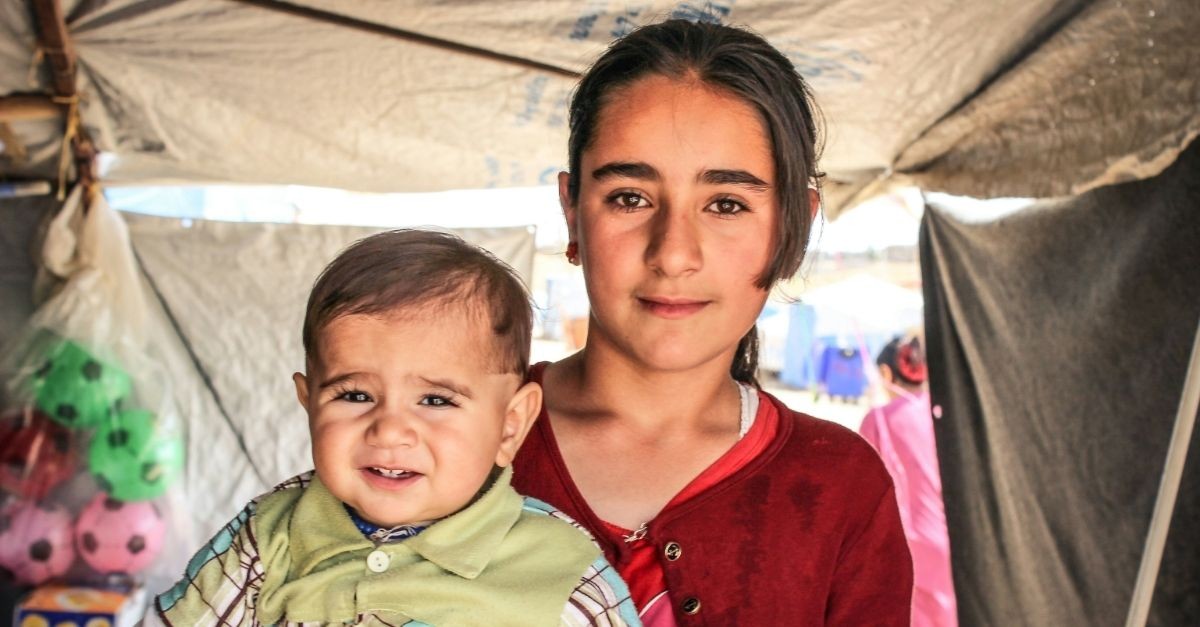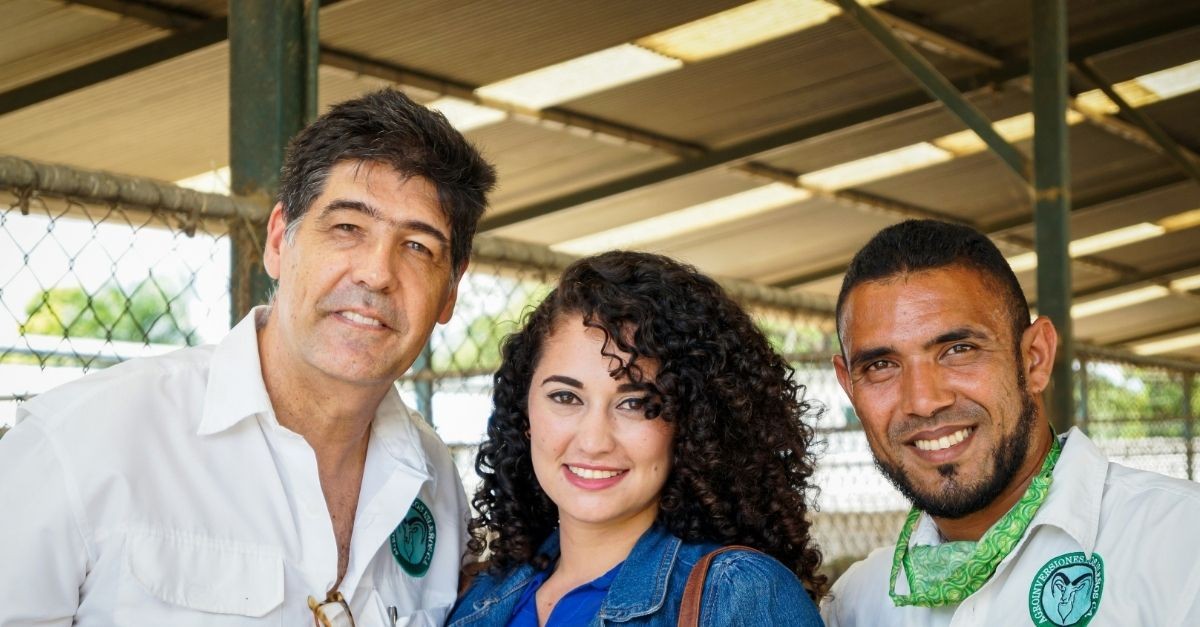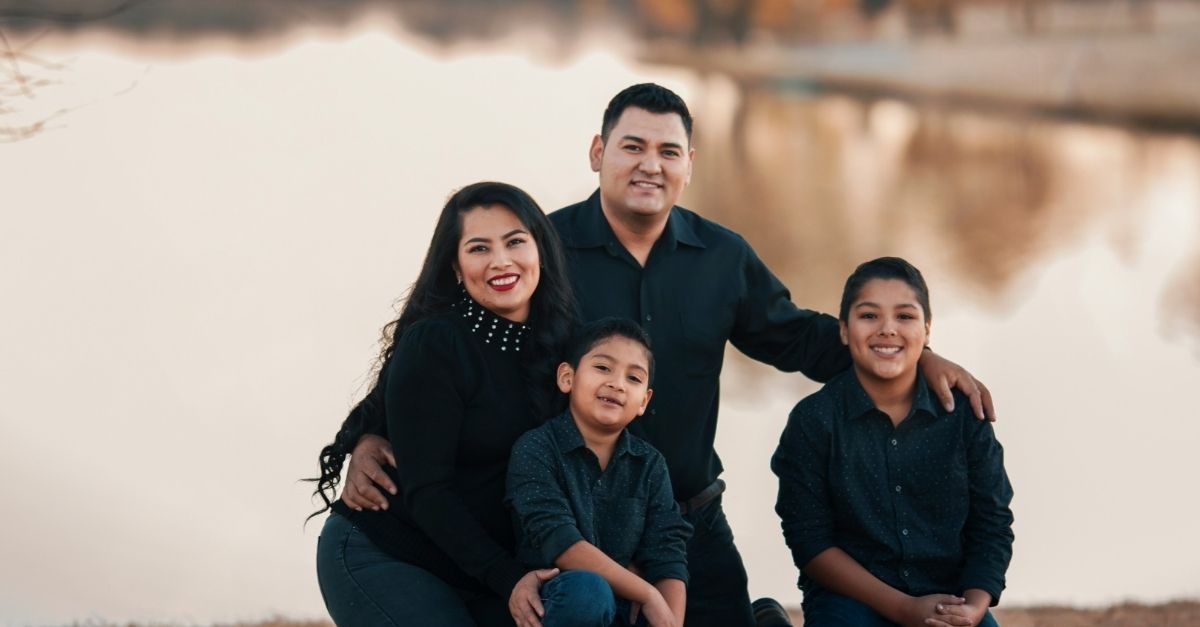
NOTE: Actual names have been changed for the privacy and protection of real, at-risk refugees
“When you see on earth the man who has encountered the shipwreck of poverty, do not judge him, do not seek an account of his life, but free him from his misfortune.” – John Chrysostom (c. 347–407 A.D.)
“We are not to reflect on the merits of people, but to consider the image of God in them.” - John Calvin (1509–1564 A.D.), Institutes of the Christian Religion
The view from the elevated parking lot overlooked a narrow sidewalk meandering around a building to one of many small, nondescript apartments in the sprawling complex. The apartment didn't stand out, but the people living inside certainly do, especially around these parts.
Upon entering and removing my shoes, I am graciously offered refreshments. After all, I am a guest in their home. Orange juice. Dried fruits. Twinkies. And other well-meaning goodies that derail a low-carb diet. Yet here, carbs have never tasted so good. We are also expected to sit and visit for a while as we eat. In an American culture where the act of lingering in conversation is rarely accomplished without the interruption of the endless beeping or buzzing of cell phones, or without a strict time limit imposed before whisking away to the next thing to do, sitting with this foreign family who has little regard for the clock feels awkward and difficult at first. But after a few times, I came to love it…
To love them.
The apartment was a modest space for a dad, mom, and two small children. Add another adult cousin to the same space, and things were downright cramped. But I never heard them complain. Not one time. I only heard gratitude heaped upon gratitude.
I met Nasir and his family in my hometown of Nashville, Tennessee. In 2021, our church partnered with a local nonprofit agency founded by a Christian who fled to the United States to escape persecution. It is dedicated to helping refugees settle and find their footing in our city and its surrounding areas, fostering both financial support as well as opportunities to meet and build new friendships. Of the countless people I have met in more than two decades in ministry, Nasir remains one of the kindest.
He is also a Muslim.
No one wants to hear a pastor talk about politics, but as I have often told the church where I pastor, we’re not bringing politics into the door; rather, politics have broken through the door without our consent. Thus, we are bound by our duty to Christ to address those parts of the political discourse being intermingled with faith, certainly when they profoundly affect the thoughts, words, and actions of those whom we shepherd—and especially when they adversely affect the poor, who “are Christ's representatives among us."[1]
The good news is that the Good News offers clarity and hope on these matters, inviting us to walk in peace and justice as we address the issues of our own time that may be unique to us, but are not wholly unique in Church history.
[1] Jonathan Edwards (1703–1758 A.D.), Sermon: Christian Charity.
Photo Credit: ©Unsplash/Jonathan Ramalho

Allies or Enemies?
It has been said that Joseph and Mary’s flight from Herod’s evil intentions to kill baby Jesus “is the archetype of every refugee family.”[1] In today’s political climate, such statements are offensive—and to be clear, offensive to many professing Christians. But when I consider Nasir’s family’s sojourn to get to the United States, I can see the similarities. Hiding from brutality. Escaping in secret. Living for years as foreigners.
Nasir and his cousin, Farid, fled to the United States after putting their lives on the line in Afghanistan, working with American forces in a collective fight against the ruthless inhumanity of the Taliban. Our church spent about a year building relationships with this family from the other side of the world. Our main task was to help furnish their apartment. We are not a large church, so we spent time raising the money, and I remember many times driving truckloads of much-needed furniture and supplies (and of course, toys for the kids) to their apartment. I also had the honor of assembling much of the furniture, which gave us time to hang out and get to know one another.
I’ve taken quite a few short-term mission trips over the years to places like Cuba, Bolivia, and Panama. I once spent almost a month in Iceland. As the only non-Icelandic guy in most settings who didn’t speak the language, I stood out like a sore English-speaking thumb. I felt awkward and like I was in everyone’s way, mostly ignorant of the customs and idiosyncrasies of the established culture around me. I was an outsider—and it showed. I felt it. I didn’t like it.
Nasir and his family know this feeling on an exponential level, but they face their situation with grit and grace. We have shared meals around their table. We’ve picnicked together in a local park with people from our church. We’ve commiserated about jobs and the challenges of surviving, let alone navigating daily logistics and budgeting in the fast-paced American culture. Nasir and Farid work in a factory on the far end of Nashville that manufactures cleaning supplies. Not owning a car and getting to work across town is itself a harrowing journey filled with delays, inconveniences, and the general difficulty of being foreign in a foreign culture’s existing routines.
They have left family and friends behind. They have small children whose lives were in danger, a fear I only briefly experienced when my sixteen-year-old drove to school on her own. But to imagine that she was in kind of danger perpetuated by bad political and military actors seeking to harm her? I can’t fathom. Nasir and Farid don’t have to imagine what it feels like. They know such realities. Yet, they were courageous enough to resist the dangerous systems of their homeland—and then to literally run for their lives.
Now, here in my hometown, a foreign land, they exude an unwavering kindness and work ethic, ideals proudly proclaimed in the legacy of our American polity and history. We began as strangers, but have each endeavored to develop true hospitality toward the other. As the late Tim Keller pointed out, “The New Testament word for hospitality literally means, 'love of strangers.'"[2] We may have started out as strangers, but to this day, when Nasir texts me, he always calls me “brother.”
But is Nasir my “neighbor” in the way the New Testament uses the term? That’s the central question I am addressing here. There is certainly merit to other questions, including whether or not it is the government’s responsibility to care for the poor as opposed to the Church’s. I would certainly agree that the onus falls on the Church above anyone else. After all, the early Church made the intentional act of caring for the poor a primary focus of their theology and orthopraxy (Acts 6, Galatians 2:10). Echoing Jesus’s sentiments in Luke 12, the Fourth Century church father Basil the Great (c. 330–379 A.D.) remarked, “The bread you store belongs to the hungry; the cloak you keep in your chest belongs to the naked; the shoes rotting in your closet belong to the barefoot.”[3] He was merely following in the footsteps of Jesus, the disciples, and apostles like Paul, who said, “I have been crucified with Christ and I no longer live, but Christ lives in me.”[4]
Anytime we read Scripture or the works of ancient Church leaders, we must remember that such writings are written to believers, not unbelievers. In this case, then, each of us who belong to the Body of Christ are invited to evaluate to what degree we are taking such divine obligations to heart—that is, are we actively caring for the poor, the immigrant, and the refugee in the ways we may claim the government shouldn’t? Do we feel that the bread we store belongs to the hungry? In fact, are we even thinking about people like refugees and immigrants in the ways Scripture clearly leads us to think?
To that end, perhaps seeing how recent governmental changes are affecting real refugees will clarify the work we should be doing as the Church.
[1] Pope Pius XII (1876–1958 A.D.), Exsul Familia
[2] https://gospelinlife.com/all-resources/
[3] Basil the Great (c. 330–379 A.D.), Homily on Luke 12:18
[4] Galatians 2:20 NIV
Photo Credit: ©Unsplash/ Priscilla Du Preez

Unprecedented Changes
I will never forget the moment the email hit my inbox. It is with deep grief that we share that the Department of State has terminated all its grant agreements related to the U.S. Refugee Admissions Program (USRAP), effective February 27th, 2025. An Executive Order—purportedly to prioritize national security—terminated all funding for the U.S. Refugee Admissions Program (USRAP). This left nonprofits, like the one that helped Nasir’s family find a home, without resources to support new arrivals, forcing many refugees into uncertainty.
It is a situation unlike anything ever seen since the federal government formally established the US Refugee Admission Program in 1980. Though the ceilings, policies, and areas of focus have certainly fluctuated over the past forty-five years, every single administration on both sides of the aisle has upheld and supported the humanitarian work of the USRAP in some way until now. The work has always been important enough to set aside political differences. Even the stalwart icon and patriarch of modern conservative politics, Ronald Reagan, passed the Immigration Reform and Control Act (IRCA) in 1986, which granted amnesty and a path to citizenship for millions of undocumented immigrants. Though not directly related to the USRAP, such policies recently defined our collective national, moral schemata for the way we see and treat people coming here (or fleeing here) for a better life, or for the preservation of a life at all.
But now, such paths no longer exist in America—and more alarmingly, the bulldozers destroying these paths have Christian bumper stickers.
From a practical standpoint, as stated by the recently defunded nonprofit agency, “Refugees are also the most vetted of all immigrants in the United States immigration system, with both domestic and international security agencies collaborating on an extensive screening process before approval is given to travel to the country.” My time with Nasir certainly corroborated these truths. After all, members of his family had served as interpreters for the American military, literally saving the lives of numerous servicemen and women. These are not terrorists. These are allies, and in some cases, heroes (I know soldiers who certainly feel such sentiments for their former interpreters).
These are real refugees, not just hypothetical fodder for sensational media stories. They came to the U.S. legally, meaning they do not contribute to insecure borders. They work hard. They pay taxes. Like all refugees (and immigrants, including undocumented immigrants), they are much less likely to commit any crimes than U.S. citizens.[1] But now, though they have done nothing to disparage, betray, or otherwise threaten our country, they are allies no more, much less neighbors—all in the name of protectionism, isolationism, and nativism. More alarmingly, some claim it is also in the name of Jesus.
Unlike some times in American History, these days, putting “America first” means putting such people last. And not feel bad for doing so. As a conservative influencer and professing Christian[2], Matt Walsh, recently posted, “I don't want to give the Statue of Liberty to France, but I do think we should remove that dumb poem about the ‘huddled masses’ and send that to them. They can attach it to the Eiffel Tower or something. America is not an international homeless shelter.”[3] This is now an acceptable, unapologetic “Christian” viewpoint in America. Full stop. There is little pushback or outrage over such statements.
To be clear, my point is not really about politics, but rather about what the Bible says to the American Church—that is, to our part of Christ’s singular, international, multicultural Body—about how we should think and act in regards to such rhetorical and political flashpoints. More specifically, we must look to those places where church language and leadership are being curbed inward or co-opted for political purposes. It is one thing for a political party or leader to push the boundaries of orthodoxy or to push the envelope on the conventions of a nation’s history. It is another thing altogether when said pushing is not only labeled as the “Christian” way, but also the way it has always been, even if it is verifiably not. Such moments must be evaluated because, as Christians, something much more important than our country is at stake: our alignment with the Kingdom of God itself.
[1] Debunking the Myth of Immigrants and Crime, American Immigration Council, October 2024. https://www.americanimmigrationcouncil.org/sites/default/files/research/debunking_the_myth_of_immigrants_and_crime.pdf
[2] https://www.dailywire.com/news/walsh-many-people-have-asked-me-tone-down-jesus-matt-walsh
[3] Matt Walsh X Post from March 18, 2025. https://x.com/MattWalshBlog/status/1901992126168047971
Photo Credit: ©Unsplash/Jonathan Ramalho

Who Is My Neighbor?
The mettle of our commitment to the ways of God’s Kingdom is tested when certain ideas rise to the surface within the political actions and statements of those claiming to honor and represent the Christian way. Recently, in regards to immigrants and refugees, a prominent politician made this statement: “There is a Christian concept that you love your family and then you love your neighbor, and then you love your community, and then you love your fellow citizens, and then after that, prioritize the rest of the world. A lot of the far left has completely inverted that."[1] The context is that helping immigrants somehow inverts God’s supposedly clearly articulated intention that we first concentrate on helping our own.
The media frenzy that followed these comments led to robust debate about the medieval Catholic concept of ordo amorus; that is, the order of love (or charity). Indeed, St. Augustine wrote about this concept in the early Fifth Century, as did St. Thomas Aquinas in the Fourteenth Century. But their writings on the concept were more about circumstance, proximity, and season than the priority of one’s heart toward foreigners or strangers. Yes, we are biblically called to care for our families, but such imperatives are more about the minimum expectations of any human, and more specifically, references to how much more compassion and charity are expected from a Christian than others. Ergo, the Apostle Paul wrote to his protégé, Timothy: “Anyone who does not provide for their relatives, and especially for their own household, has denied the faith and is worse than an unbeliever.”[2] In other words, “Of course you should care for your family! This should go without saying!”
The late theologian, Dallas Willard, had a colorful way of describing Jesus’s take on such minimums. “A contemporary wording of Jesus’s comparison of God’s kind of love, agape, and what normally passes for love might be ‘What’s so great if you love those who love you? Terrorists do that! If that’s all your “love” amounts to, God certainly is not involved.’” Yes, all love comes from God, but there is love seen in almost every human as a result of their divine-inherited image. Willard continues, “Or suppose you are friendly to ‘our kind of people.’ So is the Mafia!”[3] (Matthew 5:46-47) In other words, Jesus doesn’t offer excess praise for simply watching out for one’s own inner circle.
On the contrary, as the theologian Tertullian (c. 160–225 A.D.) stated, “It is mainly the deeds of a love so noble that lead many to put a brand upon us,” which has been further paraphrased as, “It is our care of the helpless, our practice of lovingkindness, that brands us in the eyes of many of our opponents.”[4] To be clear, believers in his time were being persecuted for their overwhelmingly selfless treatment of people like refugees and immigrants. Today, some Christians are also being persecuted for their selfless treatment of those in need, but with one startling and bewildering caveat: they are being persecuted by other professing Christians.
The most disquieting part of citing ordo amorus as a part of some alternate history or orthodoxy anchoring a valid Christian tradition to neglect the care of refugees and immigrants is the undeniably plain way Jesus chose to define the term “neighbor.” In Luke’s gospel, an expert in Jewish law steps up to test Jesus and actually proves that the message Jesus was teaching was already in alignment with Israelite directives. Jesus asks him to sum up the law and he replies, “’ Love the Lord your God with all your heart and with all your soul and with all your strength and with all your mind’; and, ‘Love your neighbor as yourself.’” (10:27). Jesus agrees, but the expert still “wanted to justify himself, so he asked Jesus, ‘And who is my neighbor?’” (vs. 29)
Pay attention here. When Christ is directly asked about his best definition of loving one’s neighbor, he responds with one of his most famous parables—and to our surprise, it is not a cautionary tale about the dangers of loving strangers to the exclusion of one’s family or nation. Rather, Jesus tells the story of a foreigner—and in this case, an enemy of the Jewish nation (a Samaritan)—stopping to help a Jewish man who has been beaten and left for dead. It was a scandalous story for the hearers. But for us, perhaps the most scandalous part is again hearing that when Jesus Himself describes the purest, most direct example of the radical love He expects his followers to show towards their “neighbor,” he chooses the specific example of a native receiving aid from a foreigner. How much more should the native be expected to care for and help the foreigner in need?
That was Jesus’s point.
[1] https://youtu.be/F_G3_BXBjoM
[2] 1 Timothy 5:8 NIV
[3] Dallas Willard, The Great Omission: Reclaiming Jesus’s Essential Teachings on Discipleship, (2014, HarperOne).
[4] Tertullian, Apology, Chapter 39 (emphasis mine)
Photo Credit: ©Unsplash/ M.T ElGassier

How Then Should We Live?
Simply put, the way of Christ does not call us to pick and choose who is worthy of mercy. He expects us to walk in the same action and attitude as he does, not in the minimums of Christian rhetoric. His Word is clear: our role is whole-hearted sacrifice reflecting an eager and deep devotion to the One who sacrificed himself for us. In truth, this is Gospel 101, verified by more biblical passages than one could possibly fit into such a short space.
But aren’t we permitted to have political opinions unrelated to our obedience and devotion to Christ? Biblically, the answer may sound surprising in our current climate: it’s a clear “no.” We should be grateful for and good stewards of our civic freedoms and duties, but our devotion to political viewpoints must pale in comparison to our devotion to the biblical ways of Christ, and those ways are unambiguous when it comes to our attitudes toward people like immigrants and refugees. "He upholds the cause of the oppressed and gives food to the hungry. The Lord sets prisoners free, the Lord gives sight to the blind, the Lord lifts up those who are bowed down... the Lord watches over the foreigner and sustains the fatherless and the widow."[1] Even more shocking, God says, "Now this was the sin of your sister Sodom: She and her daughters were arrogant, overfed and unconcerned; they did not help the poor and needy."[2]
Furthermore, no political party or figure who simply, perhaps even convincingly, claims to be rushing to the defense of Christ or his ways exempts us from being faithful to weigh their attitudes and actions against those very ways, just as we would do with anyone we follow who also claims to be following Christ. In fact, if those who claim to represent Jesus sound nothing like him, avoid or refuse to do the same works he does— or dare I say it, proudly display a disposition oppositional to Jesus’s —then we should not abide in their teachings or leadership. Does such a statement hold up biblically? The Apostle John opined: “Whoever claims to live in him must live as Jesus did.”[3] There are few terms as broad as “whoever”—there is little wiggle room to reinterpret such language. If living as Jesus did is not our full-throated, full-hearted intention, then the easy answer is simply not to claim we live in him—that is, that we immolate and take our marching orders from him.
The Apostle Paul would be accused of being the “tone police” if he were to write in the present day what he penned to the Philippians some two thousand years ago: “You must have the same attitude that Christ Jesus had.”[4] In other words, we can’t claim that policies completely eclipse attitudes in the eyes of God. We can claim certain attitudes as politically expedient, but if those in political power do not even attempt to think, act, or treat the poor as Christ did (and does), we shouldn’t proclaim their attitudes or actions as being of the Christian persuasion. Each of us must reconcile ourselves to the politics we choose, but we should rest assured that the God we serve will never reconcile his Kingdom to the politics of lesser kings. There will be only one King. Such statements shouldn’t anger us; they should invigorate us, reminding us of the Source of our true life! This is the good part of the Good News. After all, in Christ’s Kingdom, we are the foreigners and refugees for whom he cares so well (Ephesians 2:19)!
A popular sentiment exists today: “I’m not electing a pastor. I’m electing a president (or senator, governor, etc.).” Truer words have never been spoken, but if they’re true, we should stop ascribing pastoral traits (or worse) to the people we’re electing (i.e.,“He alone is God’s man for the job,” “God needs him to save our country,” etc) Just let the elected officials be our politicians, a noble profession. But if they also claim to be religious leaders (or we proclaim them to be), then they must be judged by the same scriptural standards we use to judge our elders and church leaders, and rightly so.
Once our attitude and actions, governmental or otherwise, have been placed into the category of “Christian,” they must reflect the merciful approach of Christ. This is the irrefutable litmus test. We can speak or sing words of praise all we want, but as Martin Luther observed, “God wants to be praised through works of mercy.”[5] Again, if there are no works of mercy to be found, call it whatever you want—even support it, if you feel you must. Just don’t call it “Christian.” Dallas Willard points out these clear and divine demarcations: “Now reflect: Has your heart gone out in generous blessing to someone who has insulted or humiliated you? Can you work without thought of gain for the well-being of someone who openly despises you, maybe has told you to drop dead? Are you enthusiastically pulling for the success of someone competing with you for favor, position, or financial gain? That is what those possessed and permeated by God’s kind of love find themselves doing.”[6]
Yes, I realize this is not the popular refrain among the populist movement that is, at times, driving the majority of Christian sentiment in America today. But the Bible implores us to: "Speak up for those who cannot speak for themselves, for the rights of all who are destitute. Speak up and judge fairly; defend the rights of the poor and needy."[7] Again, try to fathom the breadth of “all who are destitute.” We have work to do—and it's the right kind of work. Such a posture means we must be more concerned with righteous living before the Lord than predictable accusations of “wokeness.” The low-hanging indictment of wokeness is a vague, indefinable distraction, while God’s call to the merciful treatment of those in need could not be clearer. We are to indiscriminately serve those in need, echoing John Wesley’s passion to: “Do all the good you can, by all the means you can, in all the ways you can.”[8]
[1] Psalm 146:7-9 ESV
[2] Ezekiel 16:49 NIV
[3] I John 2:6 NIV (emphasis mine)
[4] Philippians 2:5 NLT (emphasis mine)
[5] Martin Luther (1483–1546 A.D.), Sermons on the Gospel of John (John 15:1-11)
[6] Willard, The Great Omission.
[7] Proverbs 31:8-9 NIV (emphasis mine)
[8] John Wesley (1703–1791 A.D.), Sermon on the Use of Money
Photo Credit: ©Unsplash/Jorge Salvador

Our Refugee Friends Make America Great
Many American Christians today have been made afraid by the idea of this country becoming full of immigrants and refugees, not realizing that it already is. It is literally our national story, which has its own share of messiness. In his last public speech as president, Ronald Reagan said, “This, I believe, is one of the most important sources of America's greatness. We lead the world because, unique among nations, we draw our people—our strength—from every country and every corner of the world. And by doing so, we continuously renew and enrich our nation.” [1] Whether or not America once was, presently is, or should someday become more of a “Christian nation” is a debate for another time and place. However, statements like Reagan’s at least offer glimpses of a past nobility and beauty rather than a present fear and suspicion. Some think the time of Reagan was when America was “great”—a time we should return to. I’m not saying that is accurate, but just for the sake of logic, if we do believe this way, should we not pay attention to such attitudes and sentiments from that supposedly hallowed time?
Nasir and Farid are embodiments of the best parts of the American dream. They are friends whom we can help, not enemies to be ignored, disparaged, or worse. As Reagan concluded, “Thanks to each wave of new arrivals to this land of opportunity, we're a nation forever young, forever bursting with energy and new ideas, and always on the cutting edge, always leading the world to the next frontier. This quality is vital to our future as a nation.” If we ever closed the door to new Americans, our leadership in the world would soon be lost."[2]
Whether our leadership in the world or our witness before it, our attitude toward and treatment of refugees speaks to the heart of our beliefs; in both cases, we still have the opportunity to choose the right heart.
One final thought for those who are believers. Dear brothers and sisters in Christ, if you find yourself vehemently disagreeing with the ideas in this article to the point of inner rage, I humbly ask you to do something before diving into politically-charged, “gotcha-laden” statements of vitriol that characterize so much of current American discourse. I don’t know one Christian in my life who openly intends to displease God or hurt the innocent. I’m not saying that’s you, so resist the inner lie that says I am.
Rather, like the Bereans in Acts 17 who were “fair-minded,” what if we paused and “examined the Scriptures every day to see if what Paul [or in this case, me] said was true.”[3] Specifically, the scriptures that have been quoted inaccurately or out of context, including the reason for thinking they are. Spend time pondering the Word of God on the subject, which gives us life, and try to avoid only employing alternate passages to attempt to counter the ones used here. Instead, wrestle with these specific passages and ask yourself, “What do these actually mean for me today? How am I applying them to my life, attitude, politics, and relationships right now, in this moment?”
For all of us, continual transformation comes through continual renewing of the mind (Romans 12:2). Lord, let such a renewal begin with me.
[1]Ronald Reagan, Remarks at the Presentation Ceremony for the Medal of Freedom, January 19, 1989. https://www.presidency.ucsb.edu/documents/remarks-the-presentation-ceremony-for-the-presidential-medal-freedom-5
[2] Ibid.
[3] Acts 17:11 NIV
Photo Credit: ©Unsplash/Gabriel Tovar

Listen to John's Podcast! A nerdy humorist at heart, John is a former History teacher who has been featured on Good Morning America and numerous other shows and podcasts. On his weekly podcast, Talk About That, John goes toe-to-toe with best friend and comedian Jonnie W. in hilariously real and genuinely insightful conversations about life, history, current culture, faith—and everything in between. He earned a B.A. in History and a M.S. in Curriculum and Instruction from the University of Tennessee. He lives near Nashville with his wife and daughter, where he has served as an executive and teaching pastor at The Church At Pleasant Grove for over twenty years.
Originally published Friday, 25 April 2025.
